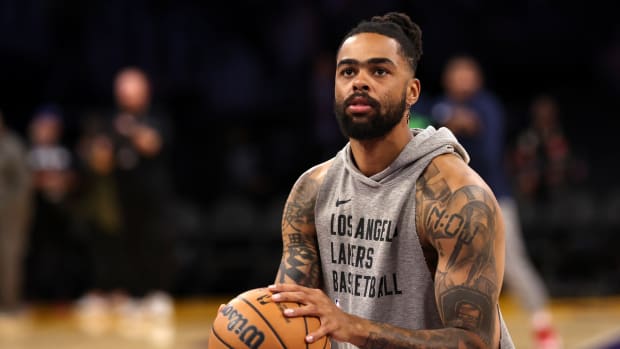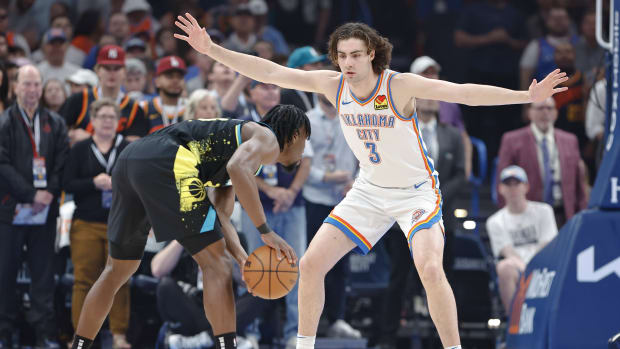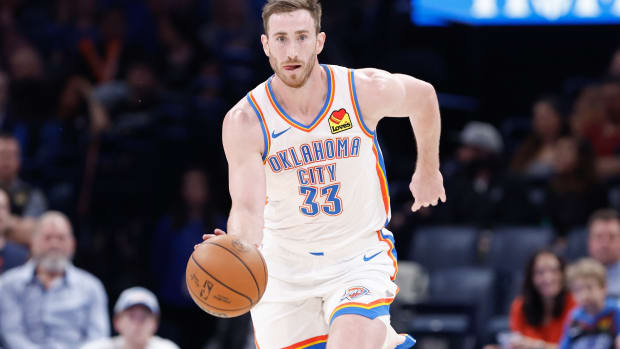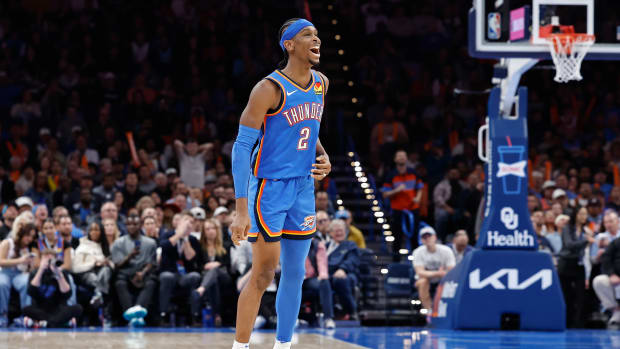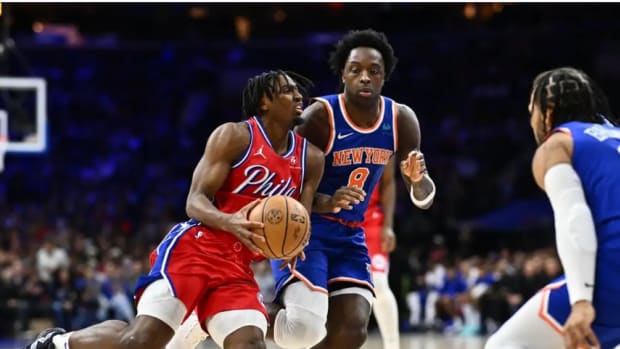Remembering Former NBA Commissioner David Stern
David Stern, a lawyer from Manhattan who rose to NBA commissioner, shepherding the league through an unprecedented 30-year period of growth, died on Wednesday in New York. He was 77.
Three weeks ago, Stern suffered a sudden brain hemorrhage and was hospitalized. He is survived by his wife of 56 years, Dianne, and sons Eric and Andrew.
Under Stern, the NBA went from dozens of employees to thousands, from domestic to global, from secondary sport to multi-billion dollar entertainment. His tenure was marked by the rise of Larry, Magic and Michael, of Kobe and Shaq, of LeBron and Dirk, and the fact that you recognize each of these athletes by first name is partly Stern’s doing. He understood the power of brands, the value of self-expression, and the lure of personality. Forever ahead of the curve, Stern read Ad Age and Mediaweek back when his peers were reading the sports section. He oversaw the creation of All-Star Weekend, the inception of the draft lottery, the first Dream Team, and, later, the D League and the WNBA. He was an early champion of cable, the internet, and international expansion. His gift was to see not just around the first corner, but two or three.
Along the way, Stern became something of an unintentional celebrity, the familiar “basketball-shaped man”, as SI once described him, who came on TV in a suit in June to announce the draft pick you hated, then reappeared a year later to hand a trophy to a team that (chances were) wasn’t yours. To fans, he represented the perfect antagonist: an empty vessel they could blame for the lockout, or the Knicks “somehow” getting Patrick Ewing, or the latest referee conspiracy.
Stern reveled in the role. He understood the value of narrative, of heroes and villains. As long as the league benefited, he was happy.
Born on September 22, 1942, Stern grew up helping out at the family business, Stern’s Deli, where his father, William, worked nights and weekends. His mother, Anna, kept the books.
Father and son bonded: David had fond memories of William taking him to Giants baseball games, and to Madison Square Garden on occasional Thursday nights to watch the Knicks, sitting in the fifty-cent seats in the blue section and believing, as boys do, that his team’s heroes, men like Harry Galatin and Richie Guerin, were better than giants like Bill Russell. (Stern remained a diehard Knicks fan for life).
After attending Rutgers and Columbia Law School, Stern met and married Dianne Bock. In 1967 he first represented the NBA, as outside counsel from the Manhattan law firm of Proskauer, Rose, Goetz and Mendelsohn. After assisting on the ABA-NBA merger, in 1978 he became the league’s general counsel, negotiating a salary cap with the National Basketball Players Association. He rose quickly and, in 1984, succeeded Larry O’Brien as commissioner.
The NBA he inherited looked little like it does today. Only a few years earlier, the majority of teams lost money. CBS had broadcast the final game of the 1980 championship series between the Lakers and the 76ers on tape-delay. A 1982 Los Angeles Times story reported 75% of NBA players were on drugs.
Stern’s arrival coincided with the prime of Larry Bird and Magic Johnson, the drafting of Michael Jordan, and the rise of ESPN. Stern leveraged all of it, understanding that it wasn’t teams or leagues that propelled a sport, but personalities. He encouraged spectacle (the lottery broadcast), myth-building (All-Star Weekend) and, above all, stars. By the end of the 80s, the league was thriving: stars sold shoes, appeared in movies and became cultural icons. Everyone wanted to be like Mike.
As a boss, Stern engendered deep loyalty among employees while driving them hard. He was the kind of guy who said, “Either you’re in or you’re out.” Dinner was ordered to the office. Projects were done when he said they were. To work for Stern was to live in fear of not being prepared. “Any of us who worked for David knew if you were in front of him, or had a meeting with him, it was really akin to arguing in front of the Supreme Court,” Val Ackerman once told David Aldridge in an oral history. “I'm serious. You knew you had about 30 seconds before you started getting bombarded with questions.”
As Silver said, when I interviewed him last year: “The one thing nobody ever disagreed on was David’s work ethic. David is always all in. Nothing he approaches is in a halfhearted way.”
Stern viewed himself as the league’s defender. "When I think back on the best stuff, I'm not thinking about Michael hitting all the threes or the last shot,” Stern said when I interviewed him last year. “I think about Magic announcing he was HIV positive, and Latrell Sprewell deciding to choke P.J. Carlesimo, Ron Artest going into the stands, [former referee Tim] Donaghy betting on games. Those were places I had to step up and protect the league and that comes with the job. That wasn't extra stress. That was the job."
At times, he faltered. He later said his greatest regret was overseeing two lockouts. He allowed Donald Sterling, the Clippers’ racist, sexist owner, to continue longer than warranted. He instituted a dress code that some, including Allen Iverson, viewed as targeting black culture. He allowed the Seattle SuperSonics to flee to Oklahoma City. Critics charged he was too controlling.
As Stern’s successor, Silver has embraced greater transparency and been hailed for it. But he wonders if Stern was just doing what was needed. "I'm not sure I would have been the right guy in 1984, when David became commissioner," Silver said last year. "David had to fight every step along the way for respect for the NBA. I inherited a very different situation. A transcendent league, one that was clearly still on the ascent. The charge for me was: Don't screw it up. David was faced with an entirely different set of circumstances. Whether David adopted his personality for the times or that's who he always was, I'm not sure."
********
When Stern left the league, in February of 2014, the exit was carefully orchestrated, followed six months later by his induction into the Hall of Fame. His legacy was secure. On his watch, the NBA grew from 23 to 30 teams. Team valuations skyrocketed, from the tens of millions to hundreds and, eventually, billions. The league went from struggling to get on TV to, in 2014, signing a 9-year, $24 billion rights deal.
Stern bristled when people suggested he “retired”. He did not intend to slow down. He became a consultant, working as an advisor to venture capital firms, investment banks, and startups. After once opposing sports gambling, and marijuana, he came around on both. He still showed up at the office, a few blocks up from NBA headquarters, at 10 AM and stayed until 7 PM. His longtime secretary and friend, Linda Tosi, greeted guests and handled his schedule, as she always had.
Stern and Silver remained close: double dating with their wives, talking politics, and commiserating. “He was a mentor to me, someone who taught me an enormous amount about business and life and someone who I continue to have enormous respect and affection for,” Silver said.
To the end, Stern remained a devout Democrat, giving to candidates, helping behind the scenes, and forever wondering when the party would get its act together. He and Dianne spent summers hiking in the Alps. He visited Eric, who lives in Montana. Often, he gathered with old friends from the early days of the league. Never, he said, did he intend to tell those stories publicly, despite requests to do a book.
After his hospitalization in December, tributes flowed from friends and colleagues. “No one influenced my values and moral compass more than this amazing mentor,” wrote Rick Welts on Twitter. “Arguably the single most important person in NBA history.” Magic Johnson, whom Stern hugged on live TV in 1992 to demonstrate HIV couldn’t be transferred by casual contact, and who Stern considered his favorite player ever, wrote: “Join Cookie and I in praying for my good friend who helped save my life, former NBA Commissioner David Stern.”
To the end, Stern retained his zest for the deal. This fall, Stern and Johnson had collaborated in funding a basketball technology startup. Like all new ideas Stern hit upon, he’d been giddy about it. “All these are pieces of the puzzle,” he told me of the startup last year. “The fun part of the NBA was trying to put the pieces together. And the fun part of life after the NBA is the same. It hasn’t changed. It is one big puzzle and it’s great fun.”
Some quotes in this story also appeared in SI’s 2018 story on Stern































